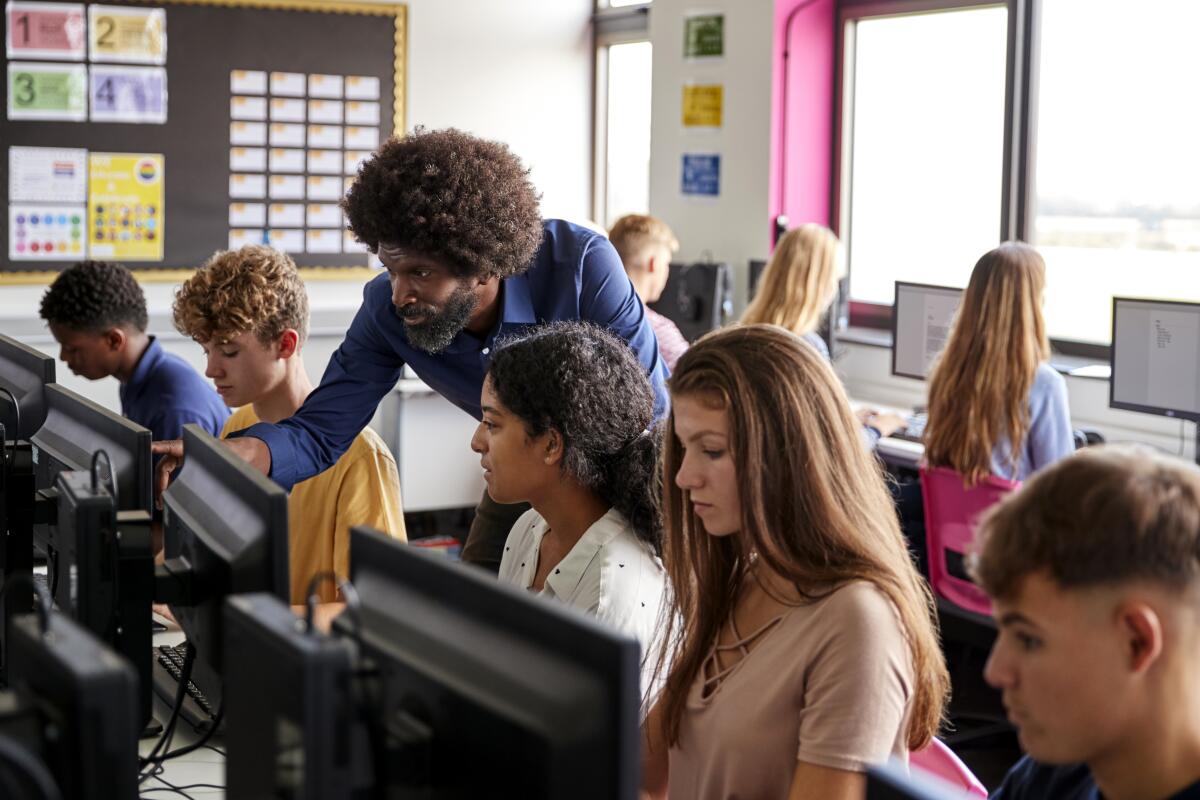Op-Ed: How the business and tech communities can help erase the digital divide

The computer science industry is filled with talented techies, most of whom are white or Asian. Black professionals make up only 5% of the tech workforce, a segment that increased by only 1 percentage point between 2014 and 2020, according to a recent report. That’s unacceptable.
Much is made of the digital divide, but little has been done to eradicate it. Bias in artificial intelligence, its algorithms and its training data are direct byproducts of the divide. These biases are more dangerous than ever because they can impact decision-making on a massive scale and at breakneck speeds, hindering business in all sectors of the economy.
To help solve this problem, we need to get more underrepresented communities into careers in computing and engineering, especially data science. More, and different, perspectives can only help lead to better products and services. At the same time, we can truly advance a Black and brown middle class, and create generational wealth, boosting economic growth and providing an entire new set of industries and opportunities across the nation.
It won’t be easy to grow such a culture of tech producers in underrepresented communities, but it is absolutely doable.
The organization I lead, Memphis-based CodeCrew, and others such as the California-based Black Girls Code, are working to build that culture into the heart of Black and brown communities.
The potential economic impact is significant. Computer science graduates of CodeCrew’s adult coding boot camp make an annual average starting salary of more than $51,000. Before their training, they made an average of just $15,000 per year. That boost in income can be life-changing, providing a comfortable middle-class life in Memphis and many other parts of the country.
If we are to truly diversify the tech community we are going to need help — a lot of it — from the business and technology communities.
What could they do?
Waive the four-year college requirement for entry-level computer science positions at their companies. That is often a barrier for qualified CodeCrew grads.
Set goals and targets for diversity in workplaces, especially on engineering and leadership teams, and hold themselves publicly accountable by annually publishing how they are doing, as Netflix did recently. In three years, the company doubled the number of Black employees in its workforce and on its leadership team.
At the same time, companies should take an honest look at barriers in their workplaces that prevent them from retaining diverse talent and then eliminate discriminatory or unwelcoming environments and conditions. That could include establishing equitable pay and promotion opportunities, and initiating zero-tolerance policies for harassment, stereotypes or microaggressions.
Allow a small percentage of company time for employees to participate in mentoring programs that target underrepresented groups. WorldQuant Predictive’s data scientists are working with CodeCrew students to bridge this gap and bring new skills to a diverse workforce. Google officially encourages employees to explore tech ideas not directly related to their assigned projects, a policy that has been credited with launching Gmail and Google News. Why not have that same moonshot mentality with respect to diversity, equity and inclusion goals? Mentoring is a simple but highly effective means to transmit knowledge and skills.
Set up data science/software engineering offices in more regions where there are disproportionate populations of underrepresented groups — including such places as Memphis and New Orleans.
Partner with historically Black colleges and universities, which have been working on these issues for a long time, despite being under-resourced. Then make sure to include these schools, along with diverse coding bootcamps, as sources for talent — and increase financial support for them.
Lobby the federal government to subsidize or otherwise make broadband internet access affordable in low-income communities, much like food is subsidized. Broadband is no longer a luxury, but a necessity, and should be treated as a utility, like electricity, gas and water.
Doing these things can create a new environment for data science and AI. But that is just a means to an overall greater outcome, which is building businesses by increasing the number of people of color in technology.
In doing so, we could become more internationally competitive with a rising China, advancing India, resurging Russia and unified European Union.
To bridge the digital divide, we need to catch future techies early. Every child should have access to computer science and computational thinking in school. CodeCrew is working in Tennessee to help secure passage of legislation that requires every high school in the state to offer computer science classes and provide the necessary funding to train teachers to lead these classes.
Of the 500 kids CodeCrew works with each week, more than 90% are Black and Latinx youth. The vast majority of our students are more likely to go on to study computer science. With an assist from businesses and tech companies, overdue change like this could happen on a national level — and businesses would ultimately be the biggest beneficiaries.
Meka Egwuekwe is executive director of CodeCrew.
More to Read
A cure for the common opinion
Get thought-provoking perspectives with our weekly newsletter.
You may occasionally receive promotional content from the Los Angeles Times.










